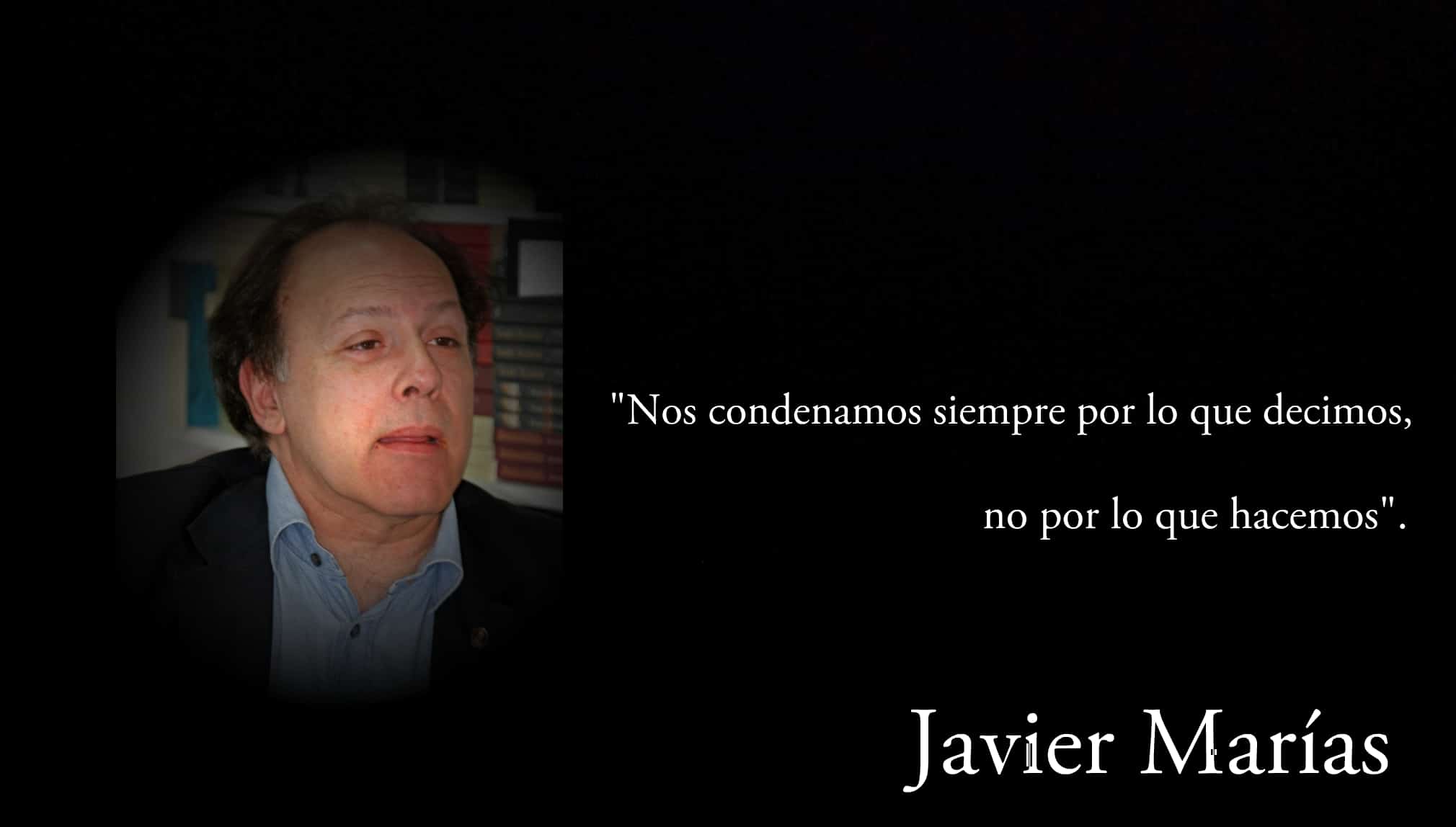
Xavier Marias.
Javier Marías, “He has developed a style that is not a merely formal aspect but a way of looking at the world. His writing is thought in action, and readers assist him ”. The phrase corresponds to Winston Manrique Sabogal (The country, 2012), who defines the writer as “one of the most innovative European novelists”. Not surprisingly, his work has been published in more than 40 languages.
He has published sixteen novels plus considerable translations, editions, and some short stories. Likewise, he has collaborated through various essays and articles with prestigious national and international media. Since 2008 occupies the armchair of the Royal Spanish Academy. His books are among the best in the entire literary history of Spain.
Bibliographic profile
Birth and childhood
Javier Marias Franco He was born in Madrid on September 20, 1951. He is the fourth of the five children of the marriage between the philosopher - a member of the Royal Spanish Academy - Julián Marías and the writer Dolores Franco Manera. His father, a Republican, was banned from practicing at Francoist universities for refusing to swear to the Principles of the National Movement (1958).
Consequently, the entire family moved to the United States beginning in 1951. There, Julián Marías taught at Yale University until the late 50s. Once he returned to Spain, young Javier was educated at the Estudio School under the liberal principles inherited from the Institución Libre de Enseñanza.
A family environment very conducive to writing
At the same time, the Study College maintained a very close link with the International Institute of Boston, where Julián Marías used to give lectures. Further, the home of the Marías Franco couple was an academic center in itself. Always full of books and frequently with college students taking private lessons.
Therefore, it is not surprising that the first works produced by Javier Marías date back to his adolescence. How can it not be a favorable environment for intellectual activities if the mother graduated from the career of letters with an Extraordinary Prize. In addition, his brothers are recognized as academic and art historian (Fernando), doctor in economics and film critic (Miguel), and musician (Álvaro). His uncle is the filmmaker Jesús Franco.
His father's legacy
Pablo Núñez Díaz (UNED, 2005), rightly synthesizes Julián Marías' influence on his son: “… that he did not allow himself to be carried away by slogans or passing political movements most likely influenced Javier's education. Obviously, the legacy that the writer received from his father was not only ethical or political - which would not be small - but also included a passion for philosophical thought, literature and languages ”.
On the other hand, Catalina Jiménez Correa (2017), from the Universidad Autónoma de Occidente (Colombia), analyzes the ancestry of the father in the articles by Javier Marías. Specifically, it expresses: “The figure of his father, mentioned 348 times during the 238 columns studied (between 2009 and 2013). It is, without a doubt, the moral reference and stronger intellectual for Marías ”.
The newest
Javier Marías has defined himself as part of the so-called generation of 70, the newest. It encompasses a group of intellectuals born after the Spanish Civil War, who, despite having been trained during the Franco regime, received an unconventional parallel education.
Unlike the committed rhetoric of previous decades, the newest ones do not use literature as an instrument of sociopolitical transformation. Likewise, the members of this group do not care much about the traditional technical resources of Spanish writing. On the contrary, they are inclined to use exotic elements extrapolated from authors in other languages and to create cunning, tangled characters, full of tricks.
Analysis of his works
Undoubtedly, the best known work of Javier Marías is his work as a novelist. However, its enormous number of translations, short story anthologies and published press articles (plus the awards obtained) cannot be overlooked. From the beginning of his more than 40 years of literary career, Marías has shown not to be governed by the parameters of the Spanish narrative tradition.

Tomorrow in the battle, think of me as Javier Marías.
Transforming spirit
His renewing sign is evident in his first novel, In the domain of the wolf (1971) It is a story with a clear cinematic influence, set between the 1920s and 1930s and with American protagonists. Soon after, this innovative trait is confirmed in Crossing the horizon (1972). Although a thick anachronism is evident in his second book, it is still a consistent and open narrative.
However, Marías did not end up very satisfied with the "pasticho" of his third novel, The monarch of time (1978) This is probably why he reissued it in 2003. In 1983 his fourth novel was released, The century, characterized by its argument of contrasts presented by pairs of chapters. It was the first of his books where the narrative alternated passages between the first and third person.
Own style
According to Sandra Navarro Gil (Journal of Philology, 2004), in The sentimental man (1986) Marías develops characters and themes from previous titles in depth. From this title, the Madrid-born author achieves “… a new way of understanding literature: the playful desire of his first novels gives way to the exercise of a novel understood as introspection in which thought, and not invention, becomes in the main narrative material ”.
The sentimental man becomes the consolidation of a style characterized by a reflective narrator in the first person, punctually supported by meta-fictional resources. The evolution of his first three novels, dominated by more cunning and / or melodramatic characters, gradually shifted towards more intimate, detailed and scrupulous passages.
Consolidation
With All souls (1989), the Spanish writer takes an interesting turn towards a fiction loaded with autobiographical overtones. Then, the launches of Heart so white (1992) and Tomorrow in battle think of me (1994) represent the greatest editorial successes to date. Likewise, the XNUMXs are a period of numerous awards for Marías, not only for his novels, but also for his translations, articles and essays.
The black back of time (1998) was a novel-essay dominated by the author's reflections on the inexorable passage of time. This title preceded the —probably— masterpiece of Javier Marías, Your face tomorrow. It is a novel with more than 1.500 pages delivered in three volumes: Fever and spear (2002) Dance and dream (2004) and Summer and shade and goodbye (2007)
Constant renewal and consistency
After the resounding success of Your face tomorrow Marías innovated again with the introduction of a female narrator in Crushes (2011) It is a best-selling book (more than 100.000 copies) and critically acclaimed thanks to its detective plot amidst ethical and moral dilemmas. However, the most memorable event associated with this novel is the National Prize for Spanish Narrative, rejected by the writer.

Phrase by Javier Marías.
On that decline, Javier Marías stated (October 2012): “I am being consistent with what I have always said, that I would never receive an institutional award. If the PSOE had been in power, it would have done the same ... I have rejected all remuneration that comes from the public purse. I have said not on a few occasions that if it were granted to me, I would not be able to accept any prize ”.
Complete list of his books
- In the domain of the wolf. Novel (Edhasa, 1971).
- Crossing the horizon. Novel (La Gaya Ciencia, 1973).
- The monarch of time. Novel (Alfaguara, 1978).
- The century. Novel (Seix Barral, 1983).
- The sentimental man. Novel (Anagrama, 1986).
- All souls. Novel (Anagrama, 1989).
- Unique tales. Essay (Siruela, 1989).
- While they sleep. Story (Anagrama, 1990).
- Heart so white. Novel (Anagrama, 1992).
- Written lives. Essay (Siruela, 1992).
- Tomorrow in battle think of me. Novel (Anagrama, 1994).
- When i was mortal. Story (Alfaguara, 1996).
- The man who seemed to want nothing. Essay (Espasa, 1996).
- Lookouts. Essay (Alfaguara, 1997).
- If I woke up again by William Fauklner. Essay (Alfaguara, 1997).
- Black back of time. Novel (Alfaguara, 1998).
- Bad character. Story (Plaza & Janés, 1998).
- Since i saw you die by Vladimir Nabokov. Essay (Alfaguara, 1999).
- Fever and spear. Novel (Alfaguara, 2002).
- Dance and dream. Novel (Alfaguara, 2004).
- Summer and shade and goodbye. Novel (Alfaguara, 2007).
- Your face tomorrow. Compilation of his three previous novels. (Alfaguara, 2009).
- Crushes. Novel (Alfaguara, 2011).
- Come find me. Children's literature (Alfaguara, 2011).
- Bad character. Acceptable and acceptable tales. Story (Alfaguara, 2012).
- This is how the bad begins. Novel (Alfaguara, 2014).
- Wellesley's Don Quixote. Notes for a course in 1984. Essay (Alfaguara, 2016).
- Berta Island. Novel (Alfaguara, 2017).
Journalistic collaborations
Many of the stories told in story texts such as When i was mortal (1996) o Bad character (1998) had their origin in the press. Similarly, Javier Marías has produced more than a dozen compilation books with content from his journalistic collaborations. Here are a few:
- Past passions (Anagram, 1991).
- Literature and ghost (Siruela, 1993).
- Ghost life (Aguilar, 1995).
- Wild and sentimental. Soccer letters (Aguilar, 2000).
- Where everything has happened. When leaving the cinema (Gutenberg Galaxy, 2005).
- The villains of the nation. Politics and society letters (Lynx Books, 2010).
- Old-fashioned lesson. Language letters (Gutenberg Galaxy, 2012).